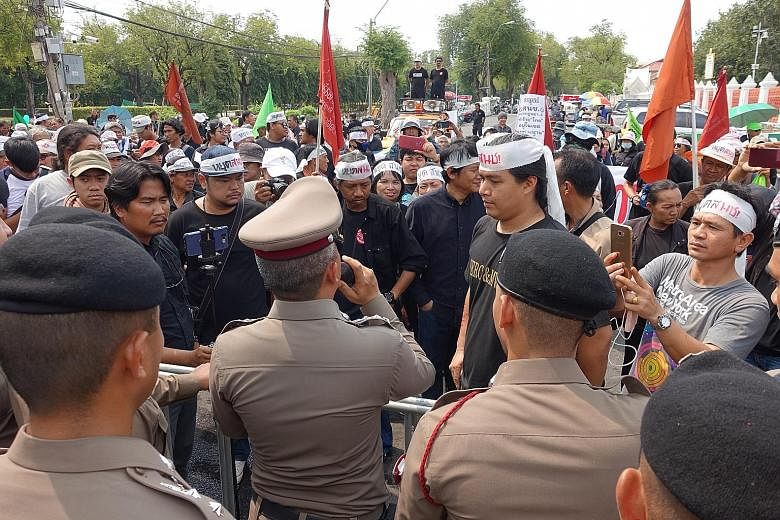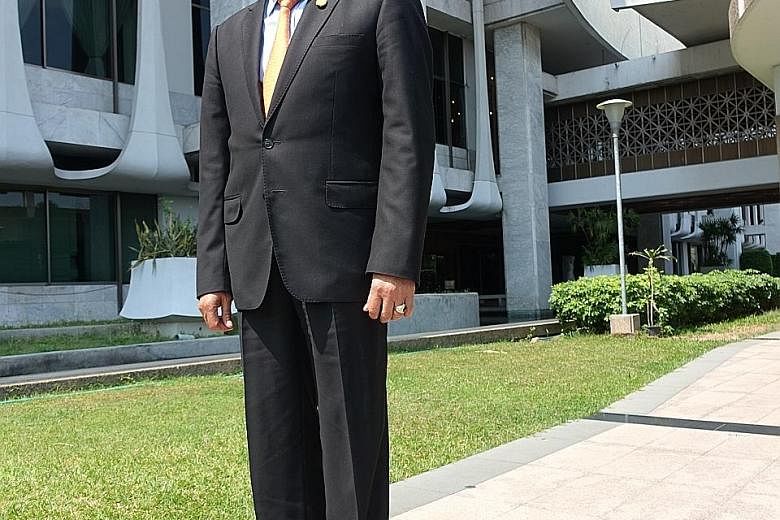There is no food for sale at Thailand's Parliament. Legislators in the members' lounge now share one toilet because the other has been closed. Glass display cabinets sit empty in the lobby.
Even as officials prepare to vacate the premises later this month, the law-making has not stopped. Quite the opposite, it is going full steam ahead.
In the last throes of its existence, just before the March 24 elections, the National Legislative Assembly (NLA) - appointed after the 2014 military coup - has been meeting even more frequently, much to the chagrin of civil rights activists who argue that any new laws should be left to the next government.
Just last week, lawmakers passed a cyber-security Bill which privacy advocates fear would give security officers unfettered access to online data without a court order.
It was the latest piece of legislation to speed through the NLA which, according to the activist group Internet Law Reform Dialogue, has passed at least 412 laws in its five-year tenure.
"This unelected NLA consists of military officers and civil servants. Without public participation, it has passed… more than 100 Bills each year. No assembly in this country's history has ever done that," said Ms Supaporn Malailoy, a manager of environmental group EnLawThai Foundation, who represented 280 signatories of a petition submitted last week to demand that the NLA stop work.
A separate petition was delivered last week by a group that faced off with policemen trying to hem them into a carpark compound a block away from the Parliament site.
Appointed legislators dismiss the notion that they are mere rubber stamps for the military government.
"Just because the law is passed doesn't mean it was easy. All the laws are carefully deliberated," lawmaker Chatchawal Suksomjit told The Straits Times.
"In a regular elected Parliament you will have a political opposition, and political games from both sides," the former justice ministry permanent secretary said. "Without that, lawmakers consider only what benefits the people."
While Thailand's Parliament has its own television station which broadcasts proceedings live, much of the political drama over the past decade has centred on the road outside its gates, just around the corner from Dusit Palace, the residence of King Maha Vajiralongkorn.
In 2008, thousands of protesters surrounded the area to prevent newly chosen prime minister Abhisit Vejjajiva from making his maiden policy speech. Four years later, when his rival Yingluck Shinawatra was in power, demonstrators blocked the Parliament building to postpone a debate on a Bill they feared would ease the way for her exiled brother - former prime minister Thaksin Shinawatra - to return to Thailand without serving jail time for his graft-related conviction.
Minority NLA lawmakers chosen to represent special interest groups say this five-year interim has allowed their voices to be counted.
"It's very difficult for us in the minority, persons with disabilities, to have our say in any political process," NLA member Monthian Buntan, who is blind, told The Straits Times. "It's about whether you accept that the reality is not perfect; you take whatever practical solution there is to achieve something that is so difficult to achieve."
Some new laws have been clear signals of progress. In January, Thailand became the first country in Asia to ratify the Work in Fishing Convention, which lays out binding requirements to ensure fishermen have enough rest and medical care.
Within the space of one week last month, the NLA passed the first, second and third reading of a new law that would bring protection standards of fishery workers up to the standards of this Convention.
Meanwhile, the latest Parliament schedule shows the NLA will hear a Bill that criminalises torture and enforced disappearance today.
While the NLA officially ceases to exist only one day before a new Parliament convenes, lawmakers are moving out of the 45-year-old building in the middle of this month, as the site is being reclaimed by the palace.
Repeated delays in the construction of a new Parliament complex by the Chao Phraya River means that appointed lawmakers may have to rent premises should they need to meet after their move.
A new Parliament formed after the March 24 election may even have to do the same.


